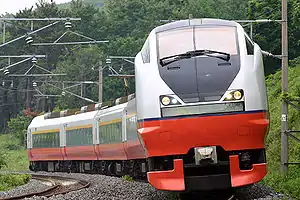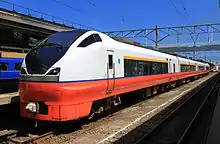Tsugaru (train)
The Tsugaru (つがる) is a limited express train service in Japan operated by East Japan Railway Company (JR East), which runs from Aomori to Hirosaki and Akita via the Tōhoku Main Line and Ōu Main Line.[2]
 An E751 series EMU on a Tsugaru service in June 2006 | |
| Overview | |
|---|---|
| Service type | Limited express |
| Predecessor | Kamoshika |
| First service | 1954 (Express) 2002 (Limited express) |
| Current operator(s) | JR East |
| Former operator(s) | JNR |
| Route | |
| Start | Aomori |
| End | Akita |
| Service frequency | 4 return services daily |
| Line(s) used | Tohoku Main Line Ou Main Line |
| On-board services | |
| Class(es) | Green + Standard |
| Technical | |
| Rolling stock | E751 series EMUs |
| Track gauge | 1,067 mm (3 ft 6 in) |
| Electrification | 20 kV AC (60 Hz) overhead |
| Operating speed | 130 km/h (80 mph)[1] |
Service pattern
Four return workings operate daily between Aomori and Akita, with two return workings between Aomori and Ōdate during busy seasons.[2]
Rolling stock
Services are normally formed of 4-car E751 series electric multiple units (EMUs) based at Aomori depot,[3] with Aomori-based 4-car 485-3000 series EMUs also used on some additional services during busy seasons.[4]
 4-car E751 series EMU on a Tsugaru service, July 2011
4-car E751 series EMU on a Tsugaru service, July 2011 6-car 485-3000 series on a Tsugaru service, June 2007
6-car 485-3000 series on a Tsugaru service, June 2007
Formations
Trains are formed as shown below, with car 1 at the Akita end.[5] All cars are no-smoking.[6]
| Car No. | 1 | 2 | 3 | 4 | |
|---|---|---|---|---|---|
| Accommodation | Green | Reserved | Reserved | Non-reserved | Non-reserved |
| Facilities | Toilet | Toilet | |||
History
The Tsugaru (津軽) was first introduced on 1 October 1954 as an express service operating between Ueno in Tokyo and Aomori via Niitsu and Akita. From 19 November 1956, the train was rerouted to run via Fukushima and Akita. This service was discontinued from the start of the revised timetable on 1 December 1993.[7]
The Tsugaru name was revived from 1 December 2002 as a limited express service operating between Hachinohe and Hirosaki, superseding the former Hatsukari limited express service which ran between Morioka and Aomori up until the opening of the Tōhoku Shinkansen extension to Hachinohe.[8] Services were formed of 6-car 485-3000 series and E751 series EMUs based at Aomori depot, with JR Hokkaido 789 series EMUs used on some services.[1]
From 4 December 2010, with the opening of the Tōhoku Shinkansen extension from Hachinohe to Shin-Aomori, the Tsugaru services were rerouted to operate between Aomori and Akita, replacing the Kamoshika and Inaho services that previously ran on this route.[2] From this date, services were formed of shortened 4-car 485-3000 series EMUs, with the E751 series EMUs temporarily removed from service.[9]
 6-car 485 series EMU, August 2003
6-car 485 series EMU, August 2003 789 series EMU on a Tsugaru service, August 2007
789 series EMU on a Tsugaru service, August 2007
From 23 April 2011, the E751 series sets were reinstated on Tsugaru services, this time formed as 4-car sets, replacing the 485-3000 series sets.[3]
References
- JR新幹線&特急列車ファイル [JR Shinkansen & Limited Express Train File]. Japan: Kōtsū Shimbun. 2008. p. 80. ISBN 978-4-330-00608-6.
- 12月4日ダイヤ改正後の青森地区列車運転体系 [Operating pattern of Aomori area trains following 4 December timetable revision]. Tetsudō Daiya Jōhō Magazine. Vol. 39 no. 320. Japan: Kōtsū Shimbun. December 2010. pp. 24–25.
- 特急「つがる」へのE751系車両導入について [Introduction of E751 series trains on "Tsugaru" limited express] (PDF) (in Japanese). Japan: East Japan Railway Company - Akita Branch. 19 April 2011. Retrieved 24 April 2011.
- DJ時刻表 [DJ Timetable]. Tetsudō Daiya Jōhō Magazine. Vol. 41 no. 338. Japan: Kōtsū Shimbun. June 2012. p. 94.
- JR電車編成表 2012冬 [JR EMU Formations - Winter 2012]. Japan: JRR. October 2011. p. 16. ISBN 978-4-330-25611-5.
- JR時刻表 [JR Timetable]. Japan: Kotsu Shimbunsha. March 2012. p. 1003.
- 列車名鑑1995 [Train Name Directory 1995]. Japan: Railway Journal. August 1995. p. 127.
- Haraguchi, Takayuki (2009). Encyclopedia of JR's Railway Cars: JR全車輌. Japan: Sekai Bunka. p. 50. ISBN 978-4-418-09905-4.
- 2010年12月ダイヤ改正について [December 2010 Timetable Revision] (in Japanese). Japan: East Japan Railway Company - Akita Branch. 24 September 2010. pp. 8–9. Archived from the original on 10 October 2010. Retrieved 6 December 2010.
External links
| Wikimedia Commons has media related to Tsugaru (train). |
- JR East 485 series Tsugaru (in Japanese)
- JR East E751 series Tsugaru (in Japanese)
.svg.png.webp)